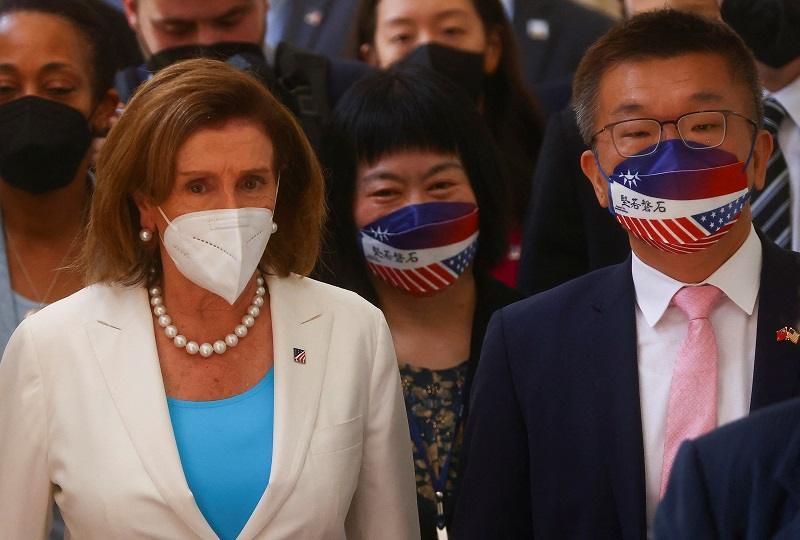Pelosi’s Taiwan trip a culmination of decades of challenging China

U.S. House of Representatives Speaker Nancy Pelosi walks next to Legislative Yuan Vice President Tsai Chi-chang as she leaves the parliament in Taipei, Taiwan August 3, 2022.
11:52 JST, August 3, 2022
In 1991, Rep. Nancy Pelosi stood on the site where two years earlier the Chinese government violently cracked down on students defending democracy in Tiananmen Square and unfurled a banner in silent protest.
The next morning, in a Beijing hotel lobby, she was confronted by an agitated J. Stapleton Roy, then the U.S. ambassador to China, in a conversation described as “dismissive” by Jeffrey Fiedler, the former secretary-treasurer at the AFL-CIO who witnessed it.
Pelosi “wasn’t particularly spooked by” Chinese officials’ anger moments after the protest, Fiedler said. She was equally unfazed by Roy’s anger.
“She was very tough. People have always, in my view, underestimated her, especially in those early years,” he added.
Pelosi’s adversarial relationship with China was thrust back into the spotlight Tuesday as she touched down in Taiwan as part of a congressional trip through Asia. Her visit to the self-governed island China claims as its own came in the face of threats from Beijing, as well as pushback within her own party, and her visit is a significant signal of American foreign policy from the politician second in line to the presidency. It’s the first trip a speaker of the House has made since Newt Gingrich in 1997.
Beijing had sent warnings of retaliation ahead of her visit as tensions escalate with the United States, while the Biden administration sent strong suggestions against her visit to the territory, a trip she postponed in April because of a coronavirus infection. Again, Pelosi was undeterred.
“In the face of the Chinese Communist Party’s (CCP) accelerating aggression, our congressional delegation’s visit should be seen as an unequivocal statement that America stands with Taiwan, our democratic partner, as it defends itself and its freedom,” she wrote in a Washington Post op-ed.
This trip marks the culmination of a 35-year career spent as an outspoken critic of China, even when domestic issues overshadowed her foreign policy work during her decades leading the Democratic caucus. Over several administrations, she often held an unpopular opinion among her Democratic colleagues, several people who worked with her described in conversations with The Post. Her posture was at times viewed as unhelpful by those who saw her persistence as disruptive to U.S.-China relations.
“She’s always rejected this reaction that the many people in the United States have had of, ‘oh, don’t upset the Chinese,'” Fiedler said. “She’s not particularly concerned with upsetting the Chinese.”
But this week’s trip to Taiwan also marked a surprising bipartisan moment as Republicans joined congressional Democrats in encouraging Pelosi’s travel, a notable about-face for a party that staunchly categorizes Democrats as weak on the communist country. Senate Minority Leader Mitch McConnell, R-Ky., and 25 GOP senators released a statement moments after Pelosi landed in Taiwan, lauding her defiance of China.
A defining moment early on
Those who know her best point to the massacre at Tiananmen Square as the catalyst that sparked Pelosi’s efforts, drawing her in both as a lawmaker representing San Francisco’s prominent Chinese community and as a mother who was pained watching college-age students, like her own children, being persecuted for defending democracy.
“It was the Tiananmen massacre that I think really was the impetus,” said Carolyn Bartholomew, the current U.S.-China economic and security review commissioner and former Pelosi chief of staff. “It was the beginning.”
Pelosi famously visited the square in 1991 where she held that banner, reading “To those who died for democracy in China,” alongside congressmen Ben Jones, D-Ga., and John Miller, R-Wash., and surprising Chinese authorities. The banner was given to Pelosi by the Rev. Chu Yiu-ming while he hosted her in Hong Kong, his son Samuel Chu recalled.
Chu, president of the Campaign for Hong Kong, remembers his father’s telling of Pelosi’s return to her Hong Kong hotel after the incident, where she was met by rounds of applause from locals, despite criticism in China for her actions.
“I felt like that that was such a courageous and also formative, I would say, experience from her,” Chu said. “I think that that, in a way, was a foundational piece to the way that she had not only dealt with China, and human rights, but I think across the board.”
Upon her return to Washington, Pelosi shepherded legislation that created a pathway to citizenship for Chinese students fleeing political persecution. In hindsight, it was a full-circle moment for Chu, whose father helped organize a system to move dissidents who participated in the Tiananmen protests to Hong Kong.
Chu noted that Pelosi, through her staff, regularly asks him about how people she met in Hong Kong decades ago are doing, as well as those who are incarcerated.
“I think that kind of leadership is so different and so unique to her. I don’t see why you travel to somewhere like Taiwan, let’s say, just to shake hands and take a photo. She has these deep relationships that she has cultivated and maintained over time.”
A bipartisan target
Pelosi didn’t reserve her criticism for China.
She at times defied both party’s leaders, including President George H.W. Bush after he vetoed a bipartisan bill to tie China’s “Most Favored Nation” status to producing evidence that it had improved on human rights. It was one of the first times Pelosi tied trade to labor practices, which continued throughout her career.
And as the Clinton administration tried to limit congressional influence on the MFN debate in 1993, those closest to Pelosi said it only emboldened her. Fiedler said her persistence is the reason President Bill Clinton could not just dismiss Congress as he had initially tried.
“Some people, I think, think she ended up with a bad relationship with Bill Clinton because of Monica [Lewinsky]. But it really was because of China and her view that he was wrong,” said Steve Elmandorf, a lobbyist and former senior adviser for Richard Gephardt of Missouri, who served as the Democratic majority leader.
Their next fight came in the late 1990s when China petitioned to join the World Trade Organization, causing a break on the issue among Democrats. Pelosi signed on to legislation that called for withdrawing the United States from the WTO if China were accepted without full U.S. support.
“This is going to be very damaging . . . to the unity of the Democratic Party,” Pelosi predicted in a 1999 interview with The Post when the Clinton administration agreed on terms to allow China into the WTO. Clinton, she added, was “trying to redeem his failed China policy” for “his own legacy.”
Upon the agreement, she played a role in pushing for the creation of the Congressional-Executive Commission on China to conduct appropriate oversight. Michael Wessel, the former general counsel for Gephardt, said Pelosi “really kept that debate alive” and ultimately was successful in “creating the moral underpinnings for U.S. policy responses to China.”
Political prisoners top of mind
Though the United States continued to try to work with the communist nation, Pelosi played an active role in reminding the world about China’s treatment of political prisoners.
In 1995, she spoke daily with Fiedler as he led negotiations to free Chinese dissident Harry Wu from detention. Fiedler remembers her being “deeply involved” in the mechanics of Wu’s release, showing extreme concern on an issue that members of Congress often gloss over.
During a visit by then-Chinese Vice President Hu Jintao to Washington in 2002, then-Democratic Whip Pelosi handed him four letters from members of Congress asking him to recognize the country’s role in human rights violations, including reports of China’s brutal treatment of political prisoners. He refused the letters.
She tried again seven years later when she traveled to China as the first female speaker of the House, asking the Chinese to release long-held political prisoners.
For the past 20 years, Pelosi has vocally opposed China’s pursuit of the Olympics. Most recently, she testified before the Congressional-Executive Commission on China last year ahead of the Winter Olympics in Beijing, where she became the most high-profile U.S. official to call for a diplomatic boycott of the Games. The Biden administration did not follow suit until nine months later, in a statement made in December.
“While we fully support and will root for our athletes, we cannot and will not be silent on human rights in China,” Pelosi said in her opening statement during this year’s CEC hearing. “If we don’t speak out about human rights violations in China because of commercial interests, we lose all moral authority to speak out against human rights violations anywhere.”
Pelosi has often made clear, including in this year’s hearing, that her objections are not directed at the Chinese people, but toward their “repressive” government.
Her second rise to the speakership coincided with President Xi Jinping’s tightening grip around democratic Hong Kong and the continued targeting of the Uyghur Muslim population in northern China under his watch. With the help of Rep. Chris Smith, R-N.J., she helped pass a bipartisan bill in 2019 imposing sanctions on Chinese officials tied to human rights abuses.
The following two years she oversaw the passage of other bills that became law. The measures sanctioned those who persecuted the Uyghur population and banned imports from China’s Xinjiang region unless the importer could prove that the items were not made using forced labor.
Pelosi’s trip this week also comes just days after both chambers of Congress passed legislation that would subsidize domestic semiconductor manufacturing and invest billions in science and technology innovation, another way to limit trade with and reliance on China, which out-competes the United States in those sectors.
But while a bipartisan group applauded her travel to Taiwan, a group of critics echo those from decades ago who worry that her persistence may harm relations with China.
In a statement issued moments after Pelosi landed, China’s Ministry of Foreign Affairs said her visit violates the one-China principle, which will have “a severe impact on the political foundation of China-U.S. relations, and seriously infringes upon China’s sovereignty and territorial integrity.”
Sen. Mitt Romney, R-Utah, criticized the speaker’s travel to Taiwan as “ill advised,” noting that the U.S. should not provoke China at a time when it is allied with Russia in the war against Ukraine.
Critics say that Pelosi’s trip is merely for show, a capstone to a political career coming to an end. But many who have watched her dedication to the issue for decades think otherwise.
“I see this as a logical, appropriate step for her in terms of her advocacy over now almost 30 years. The time is right for this,” Wessel said. “I don’t expect, whatever her next chapter is, that her advocacy on these issues is going to stop.”
"News Services" POPULAR ARTICLE
JN ACCESS RANKING







